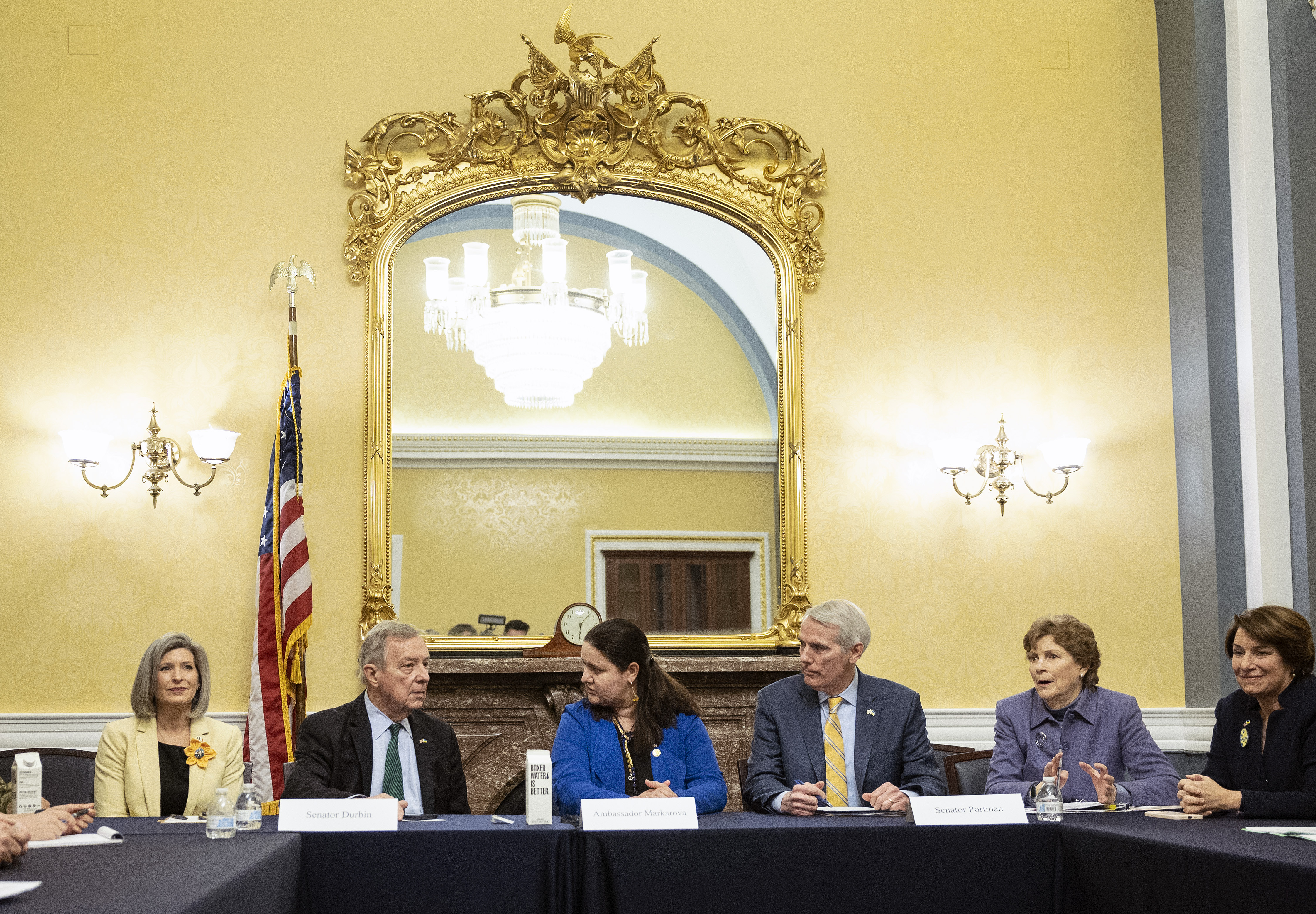Ukraine pleads with Congress for more aid and weapons

Markarova said Russian forces were targeting civilian buildings across the country, including in the Ukrainian capital, Kyiv.
President Joe Biden’s top national security officials told senators in a classified briefing later Monday night that the worst is yet to come for Kyiv: New satellite images show a large Russian convoy heading toward the city.
“Russia can hold on a lot longer than Ukraine can,” said Sen. Jim Risch of Idaho, the top Republican on the Senate Foreign Relations Committee. “This is dire.”
After the classified briefing, Senate Intelligence Committee Vice Chair Marco Rubio (R-Fla.) said Russian President Vladimir Putin is laying the groundwork for a “medieval siege” of Kyiv.
The twin meetings on Capitol Hill came as lawmakers are cobbling together an emergency spending package to aid Ukraine that will likely be added to a larger government funding bill expected to pass next week. The White House has asked for $6.4 billion but that number is likely to rise.
Lawmakers across the political spectrum support a significant boost in funding for the Ukrainian military, which has over-performed in the five days since Russian troops crossed the border. Markarova fielded questions from senators about specific types of weaponry and other supplies that could be included in the funding package.
“There was no partisanship in that room at all,” Sen. Amy Klobuchar (D-Minn.) said.
Rep. Elissa Slotkin (D-Mich.) said she has “never seen a more bipartisan classified briefing” than the Monday session between administration officials and House lawmakers, and expressed optimism Congress would approve more money to aid Ukraine.
“I think this body said, basically, ‘Tell us what you need and we’ll give it to you,’” Slotkin told reporters following the House briefing.
Still, Republicans are pushing Biden to go further with the sanctions regime he has already announced, which has so far targeted Russian banks and put the country’s economy in free fall. In a nod to Republicans, Markarova urged the U.S. to consider imposing sanctions on Russia’s energy sector, which would cripple its economy even further.
“The big difference between me and the administration … is that we’re not using the energy sector as a weapon,” Sen. Lindsey Graham (R-S.C.) said. “We’re failing to hit Putin where it hurts the most.”
The spigot of military support has meanwhile opened in recent days, with the U.S. and several European countries announcing shipments of weapons to Ukraine.
The Biden administration unlocked a fresh $350 million package of military aid for Ukraine late on Friday, including more Javelin anti-tank missiles. Germany also made waves Saturday when it committed to sending 500 Stinger anti-aircraft missiles and 1,000 anti-tank missiles to Ukraine.
Some European countries are also slated to donate older Russian-made fighter jets to Ukraine in what could be the most significant moment in the recent batch of arms transfers. POLITICO reported Monday that Ukrainian pilots have arrived in Poland to begin the process of taking control of the fighters.
The White House has so far asked Congress for $6.4 billion to respond to the Ukraine crisis. Of that, $3.5 billion would go toward the Pentagon for the deployment of thousands of U.S. troops to Europe and other measures to reassure NATO allies. Another $2.9 billion would go toward humanitarian assistance to deal with a looming refugee crisis and security aid to Ukraine and NATO countries on the alliance’s eastern front, such as Poland and the Baltics.
Senate Majority Leader Chuck Schumer said Monday that he would push to incorporate the administration’s request into a yearlong government funding package. Congress must enact funding legislation before the government runs out of money next week.
Sen. Jon Tester (D-Mont.), who chairs the panel that controls the Pentagon budget, wouldn’t discuss specifics of the administration’s Ukraine request but said passing a full-year of defense funding “would give the military the certainty and the flexibility they need to be successful.”
“We didn’t get into specific dollars,” Armed Services Chair Adam Smith (D-Wash.) said following the briefing for House members. “Clearly the need is great, both for military support for Ukraine, military support for our NATO allies and on the humanitarian side.”
Congress could easily surpass the $6.4 billion price tag in their efforts to aid Ukraine and shore up NATO allies. Some lawmakers predict an emergency assistance package could easily top $10 billion.
Senators are eyeing legislation on other fronts, too. Senate Foreign Relations Committee Chair Bob Menendez (D-N.J.) said he wants to craft a package of sanctions targeting Belarus, whose government has hosted Russian troops and aided its invasion of Ukraine. Risch later said he supports that effort.
“Now that they have not only hosted an invasion into Ukraine from their country, but are talking about engaging it in as well, it’s time for them to face consequences as well,” Menendez said.